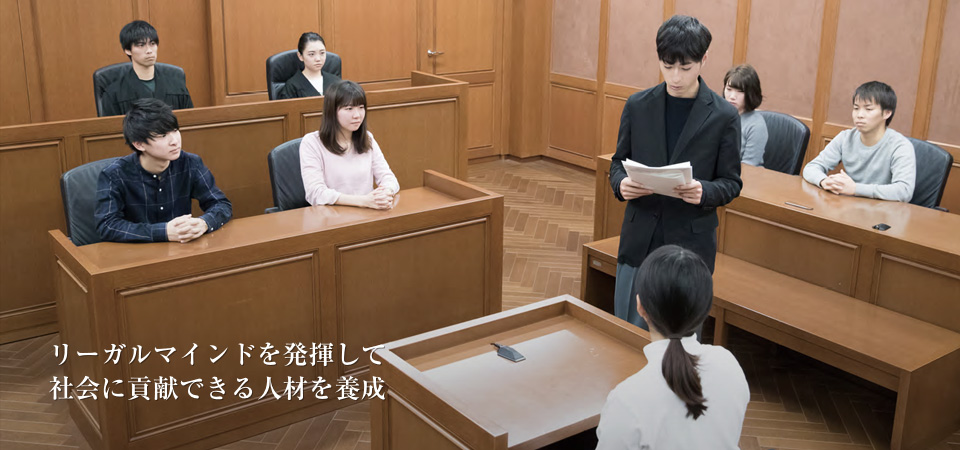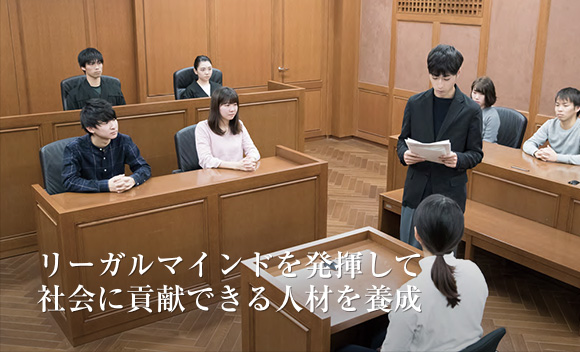Department of Law
Department of Law
Department of Current Legal Studies
Department of Political Science


Studying law means becoming an active leader in civil society, and doing so according to legal knowledge and legal thinking, with conscience and a sense of social responsibility. This department develops people of talent who, having first understood the fundamental significance of pursuing the study of law, hone their ability to make keen judgments regarding good and evil, and are able to contribute to society by making effective use of the specialized knowledge called law.
Law
Content and Characteristics
An abundant curriculum made up of over 140 courses
This department provides an abundant selection of over 140 courses. They include “Positive Law,” with instruction on currently effective statutes, “Fundamental Law,” for research on legal history, philosophy, and so on, and “Cutting-Edge Law” and “Related Branches,” which deal with intellectual property rights, consumer law, environmental law, and other such concerns.
Phased, systematic acquisition of legal knowledge
The departmental course cluster uses the system of required and required elective courses to enable the phased, systematic acquisition of learning about the law. Our courses on the positive law field, in particular, are organized to advance students’ understanding in phases, proceeding from introduction to foundation, then to fundamentals, and finally to development and establishment.
Seminars conducted consistently in small groups with fulfilling content
At the introduction and foundational stages, we conduct our education consistently in small groups. You start your study of the law in introductory courses with about 40 students per class. From the first year on, there are also seminars with surveys, reports, and discussion by students, so you can go deeper in your studies. The experience of taking seminars every year can help you to pursue more substantial research and improve your communication skills.
Complete support systems for acquiring certifications and job-seeking are also in place
The Shirokane Law Society, which is operated by full-time faculty members, registered students, and alumni, has support systems in place for students acquiring various certifications, planning to take civil service examinations, and looking for jobs. These include the Shirokane Lawyers Club and the Shirokane Public Administration Club, among others. There are also extra-curricular lectures such as those held by the National Examination Strategy Chamber. During the 2013 academic year, they initiated the Project to Support National Civil Service Examination Challengers. For students who aim to become civil servants, this project mainly targets the National Public Employee regular service and special service, the Tokyo Metropolitan Government service, and local service senior level examinations, which have been presenting particularly difficult challenges in recent years.
Four-Year Program Flow
First year: Build solid foundations with interactive education in small groups
Dialogue-based courses conducted in small groups are held in civil law and criminal law, which are crucial fields of legal study. In order to build a solid foundation in the methods of learning the law, we provide a seminar-style course, held in small groups, that is called the Foundation Seminar in Law.
Second year: Deepen understanding of basic subjects through small-group seminars
A second-year seminar is provided and seminars with small numbers of students are held to establish the basic legal subjects needed by lawyers. Basic courses focused on the Constitution, civil law, and criminal law are held for the purpose of establishing and deepening understanding of basic subjects studied in the first and second year.
Third and fourth years: With a view to future career paths, students learn about cutting-edge legal fields and also sharpen their legal thinking in seminars
In order to support acquisition of more advanced legal knowledge and the ability to think legally, seminars as well as special lectures and seminar courses on public law, civil law, and criminal law fields are provided in the third year. Students pursue more penetrating discussion of individual topics. Courses are also offered to match future career plans according to individual initiative, so that students can learn about cutting-edge fields of law, such as international corporate activity, consumer issues, environmental issues, and legal frameworks for adult guardianship.
Key Points about the Department of Law

Special Teaching Assistant (TA) System provides caring support for students
The Special TA System provides for junior researchers who are in the second stage of the doctoral course in graduate school to act as special TAs. They answer your questions about course content and talk with you about law study methods. They also offer guidance on reports in seminar courses, how to write resumes and make other related preparations, and how to write reports submitted for individual study courses. Please feel free to consult with them.
